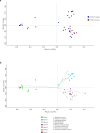Disentangling the interactions between nasopharyngeal and gut microbiome and their involvement in the modulation of COVID-19 infection
- PMID: 37728335
- PMCID: PMC10581039
- DOI: 10.1128/spectrum.02194-23
Disentangling the interactions between nasopharyngeal and gut microbiome and their involvement in the modulation of COVID-19 infection
Abstract
The human organism is inhabited by trillions of microorganisms, known as microbiota, which are considered to exploit a pivotal role in the regulation of host health and immunity. Recent investigations have suggested a relationship between the composition of the human microbiota and COVID-19 infection, highlighting a possible role of bacterial communities in the modulation of the disease severity. In this study, we performed a shotgun metagenomics analysis to explore and compare the nasopharyngeal microbiota of 38 hospitalized Italian patients with and without COVID-19 infection during the third and fourth pandemic waves. In detail, the metagenomic analysis combined with specific correlation analyses suggested a positive association of several microbial species, such as S. parasanguinis and P. melaninogenica, with the severity of COVID-19 infection. Furthermore, the comparison of the microbiota composition between the nasopharyngeal and their respective fecal samples highlighted an association between these different compartments represented by a sharing of several bacterial species. Additionally, lipidomic and deep-shotgun functional analyses of the fecal samples suggested a metabolic impact of the microbiome on the host's immune response, indicating the presence of key metabolic compounds in COVID-19 patients, such as lipid oxidation end products, potentially related to the inflammatory state. Conversely, the patients without COVID-19 displayed enzymatic patterns associated with the biosynthesis and degradation of specific compounds like lysine (synthesis) and phenylalanine (degradation) that could positively impact disease severity and contribute to modulating COVID-19 infection. IMPORTANCE The human microbiota is reported to play a major role in the regulation of host health and immunity, suggesting a possible impact on the severity of COVID-19 disease. This preliminary study investigated the possible correlation between nasopharyngeal microbiota and COVID-19 infection. In detail, the analysis of the nasopharyngeal microbiota of hospitalized Italian patients with and without COVID-19 infection suggested a positive association of several microbial species with the severity of the disease and highlighted a sharing of several bacteria species with the respective fecal samples. Moreover, the metabolic analyses suggested a possible impact of the microbiome on the host's immune response and the disease severity.
Keywords: COVID-19; gut microbiome; inflammation; microbiome; nasopharyngeal microbiota.
Conflict of interest statement
The authors declare no conflict of interest.
Figures


References
-
- Mancabelli L, Milani C, Fontana F, Lugli GA, Tarracchini C, Viappiani A, Ciociola T, Ticinesi A, Nouvenne A, Meschi T, Turroni F, Ventura M. 2022. Untangling the link between the human gut microbiota composition and the severity of the symptoms of the COVID-19 infection. Environ Microbiol 24:6453–6462. doi: 10.1111/1462-2920.16201 - DOI - PMC - PubMed
-
- Yeoh YK, Zuo T, Lui G-Y, Zhang F, Liu Q, Li AY, Chung AC, Cheung CP, Tso EY, Fung KS, Chan V, Ling L, Joynt G, Hui D-C, Chow KM, Ng SSS, Li T-M, Ng RW, Yip TC, Wong G-H, Chan FK, Wong CK, Chan PK, Ng SC. 2021. Gut microbiota composition reflects disease severity and dysfunctional immune responses in patients with COVID-19. Gut 70:698–706. doi: 10.1136/gutjnl-2020-323020 - DOI - PMC - PubMed
-
- Nagata N, Takeuchi T, Masuoka H, Aoki R, Ishikane M, Iwamoto N, Sugiyama M, Suda W, Nakanishi Y, Terada-Hirashima J, Kimura M, Nishijima T, Inooka H, Miyoshi-Akiyama T, Kojima Y, Shimokawa C, Hisaeda H, Zhang F, Yeoh YK, Ng SC, Uemura N, Itoi T, Mizokami M, Kawai T, Sugiyama H, Ohmagari N, Ohno H. 2023. Human gut microbiota and its metabolites impact immune responses in COVID-19 and its complications. Gastroenterology 164:272–288. doi: 10.1053/j.gastro.2022.09.024 - DOI - PMC - PubMed
LinkOut - more resources
Full Text Sources
Miscellaneous

